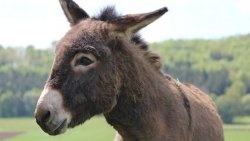
Feeding donkeys
Origin of the donkey:
African desert areas -> evolved to subsist on very poor-quality food. Under natural conditions, donkeys spend a large part of their day covering great distances in search of food.
Nutrition at its place of origin:
mainly plants that are high in crude fibre and low in energy -> donkeys are excellent feed converters and can live well on such food. They are designed to be in constant search for food.
Nutrition as a domesticated animal:
constant access to lush, protein-rich grass + little exercise, often supplemented with high-energy food such as bread or grains.
-> serious consequences for health:
- excess weight burdens the joints and leads to premature wear.
- The liver becomes fatty and can no longer fulfil its detoxifying function.
- Metabolism-related skin problems and moulting problems often arise.
- A donkey's metabolism is not designed to cope with large amounts of fatty tissue.
- Overweight donkeys have a high risk of developing laminitis.
- With increasing age, the risk of hormonal imbalances increases,
- e.g. excessive production of the body's own cortisone or a reduction in the effect of insulin.
Assessment of nutritional health.
With donkeys, fat deposits begin at the neck. With increasing overweight, fatty deposits on the ribs and along the spine can first be felt, and then are also visible. A build-up of fat in the neck can result in what is known as "fallen crest".
Comparison of the nutritional condition of horses and donkeys:
the condition described as ideal for donkeys would be described as undernourished for horses (naturally, individual body type plays a role here. Its muscles are much less pronounced, however, compared to a horse’s. Large, strong cart-horse types of donkeys are more of an exception).
Weight loss
If a donkey needs to lose weight, it is very important that this be undertaken very slowly. Otherwise, massive fat mobilization and possibly death may occur.
Losing weight should be supported by limited calorie intake and plenty of exercise and activity. Adequate energy must be supplied in winter, especially in frost periods, as otherwise the animals will freeze and be more susceptible to infectious diseases.
Base feed
A donkey’s feed should be high in roughage and low in calories and protein. Mature meadow hay and good straw is ideal (caution: a very high proportion of straw can cause constipating colic, especially in combination with too little exercise).
The daily ration should be spread out over as many meals as possible during the day. It is recommended to slow down the consumption of feed, for example by using tightly meshed hay nets or by distributing parts over several places in the field for the animal to find.
Water
Of course, donkeys must have constant access to fresh drinking water (each animal requires 8-15 litres daily).
Branches to nibble
Woody branches of trees and shrubs are important component of a donkey’s diet. Willow, birch, hazelnut, ash and aspen are good candidates. Conifers and stone fruit branches should be offered only in moderation. Caution: yew is deadly even in small quantities and is not recognized by donkeys as a poisonous plant! Boxwood, laburnum and robinia are also quite poisonous. Use only species which can be safely identified and which are known to be non-toxic. Indiscriminate use of the neighbour's garden cuttings as feed and blind trust in the animal’s instinct can cost a donkey its life!
Grazing must often be limited. It is very important that no abrupt changes in feeding occur, in order to avoid colic and laminitis. Donkeys must also be allowed limited pasture time in the spring, with gradual increases over time. Pastures must be regularly maintained to prevent unwelcome species or poisonous plants (ragwort!) from getting out of hand. Uncontrolled feeding from well-meaning neighbours or passers-by can be prevented through a friendly explanation or informative signs. For those who can’t be reasoned with, double fencing will help to prevent direct contact with the animals.
Hay substitute / supplemental feed / concentrated feed
When hay is of insufficient quantity or poor quality, Pre Alpin® Aspero (here you can add stones added to the trough to slow down hurried feeding) and Pre Alpin® Wiesencobs, Pre Alpin® Protein Light Flakes and Pre Alpin® Wiesenflakes (soaked because of often hurried eating) can serve as hay substitute or hay supplement. Older donkeys with dental problems should be given Pre Alpin® Senior as a hay substitute.
Donkeys need concentrated feed/supplemental feed only in exceptional cases, for example if a donkey is/was ill, must undertake strenuous work or if a nursing mare has lost too much weight, in which cases AlpenGrün Mash or Luzerne+ is recommended. A small quantity of high-quality plant-based oil (linseed oil, rapeseed oil) can also be an additional source of energy .
It is generally better to beef up an undernourished donkey slowly with quality base feed and crude fibre-rich supplemental feed than to do so quickly with cereals.
A high-quality mineral feed (Naturmineral) is recommended as a supplement. A salt lick should always be available.
Feeding of large donkeys
Large donkeys present special feeding requirements. In general they are much worse feed converters (poor doers!). Young growing animals must especially not be undernourished.
Most can be given unlimited access to hay. They can also be given all feed supplements (see above).



